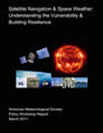Download Report
Executive Summary (excerpt)
Since the last solar maximum in 2000, societal dependence on the Global Navigation Satellite System (GNSS) has increased substantially. Critical applications, such as railway control, highway traffic management, precision agriculture, emergency response, commercial aviation, and marine navigation, require and depend on GNSS services. Everyday activities, such as banking, mobile phone operations, and even the control of power grids, are facilitated by the accurate timing provided by GPS, which is just one component of GNSS. As our national critical infrastructure and economy are increasingly dependent on positioning, navigation, and timing (PNT) services, our society is vulnerable to disruptions that can be caused by space weather or variable conditions on the Sun and in the space environment that can influence space-borne and ground-based technological systems.
Just as society takes for granted that electricity, heat, and clean water will be available, it also takes for granted that GPS will be available, reliable, and accurate. GPS is so entrenched in the daily activities of individuals, businesses, and government that any loss of satellite navigation services would be broadly disruptive. For example, effects can range from errors in a farm tractor’s onboard navigation system to positioning errors for oil drilling in the Gulf of Mexico to errors in an aircraft’s location.
Today, the vulnerabilities of GPS are well categorized, and it is understood that space weather is the largest contributor to single-frequency GPS errors and a significant factor for differential GPS. Primary space weather effects on GPS include range errors and loss of signal reception. The GPS industry faces several scientific and engineering challenges to keep pace with increasingly complex user needs: developing receivers that are resistant to scintillation and improving the prediction of the state of the ionosphere. With GPS modernization, the use of additional signals is expected to reduce errors caused by the ionosphere. However, there are several steps that can be taken now to reduce the vulnerability of GPS and its applications to space weather. ...
